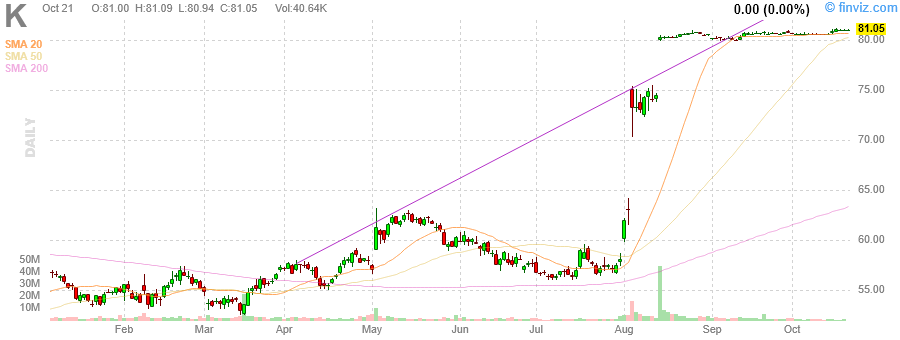I'm not sure that consumer packaged goods is the area to be in, at least not in the U.S. and not based on names like Kellogg or General Mills.From Morningstar, July 6:
For a quarter-century those manufacturers ratcheted prices as though they were tobacco companies but people find it easier to give up their Cheerios than their cigarettes.
The managements milked that approach for pretty much all it was worth so, as operating entities, they aren't all that attractive but someone will decide the only thing left to do is to asset strip or dividend recap the life out of the former cash cows.
Top o'the market to ya....
So Long, Hamburger Helper: America's Venerable Food Brands Are Struggling
Big Food is in big trouble.
For over a century, brands such as Kellogg's cereal, Campbell's soup and Aunt Jemima pancake mix filled pantries of American households that wanted safe, affordable and convenient food. They provided companies with reliable revenue growth from grocery shelves, and there was little reason to mess with that formula.In May 25's "Nine of the World's Biggest Packaged Food Companies Have Launched Venture Capital Units" we looked at the charts for the two stocks mentioned in the March introduction:
Today, these giants are struggling with competition that is corroding business from both ends. High-end consumers are shifting toward fresher items with fewer processed ingredients while cost-conscious shoppers are buying inexpensive store brands. The makers of staples including Chef Boyardee canned pasta and Hamburger Helper meal kits failed to spot the threat and didn't innovate in time.
Anyone searching for macaroni and cheese, a childhood staple, can opt for fancy pasta with organic ingredients or inexpensive store brands such as Kroger Co.'s. Squeezed in the middle are Kraft Heinz Co.'s venerable blue-and-yellow boxes.
The pressure has set off a bout of soul searching in the industry as well as some dramatic restructuring. Some companies are shedding underperforming brands, others have contemplated mergers. Nestlé SA, which said in June it was looking to sell its U.S. confectionery business, is now the target of an activist investor.
Younger companies such as Chobani, the Greek-yogurt maker, have taken market share from giants such as General Mills Inc., which came out with Greek-style Yoplait yogurt, but too late to catch up. "We were late to respond as Greek yogurt developed early in this decade," said General Mills Chief Executive Jeff Harmening, noting double-digit declines in Yoplait sales lately. "Our sales have suffered as a result."
The plight of the packaged-goods companies is a classic business tale. An industry creates winning products, carves out strong market positions and enjoys reliable, sustained revenue -- only to be too slow to adapt to changes that threaten those cash cows.
"A lot of what's crept into big companies is internal focus, bureaucracy, PowerPoint presentations -- the antithesis of agility," said Sean Connolly, chief executive of Conagra Brands Inc., maker of Hunt's ketchup, Peter Pan peanut butter and Chef Boyardee. Mr. Connolly joined Conagra in 2015 and said he is trying to shake this mentality and move faster at coming out with new products.
Many big brands didn't move fast enough to remove artificial ingredients and haven't been able to shed the negative perception of processed food, said several food executives and others close to the industry.
At the same time, they faced low-cost store brands -- or "private label" products -- from retailers such as Costco Wholesale Corp., Wal-Mart Stores Inc. and regional grocers that sell copycat products. National brands, which have huge marketing costs, generally can't afford to compete on price with the in-house brands of stores, which need little marketing beyond displaying products prominently on their own shelves.
Store brands gained popularity around the financial crisis, and analysts expect their market share to rise as they add natural brands of their own and as discount chains, which mostly sell store brands, expand.
Private-label-product shelf space has expanded 3.5% a year since 2012, estimated Credit Suisse analyst Robert Moskow in a recent report. Big brands face escalating price pressure from the incursion of store brands and from retailers demanding lower prices, he wrote. "Up to now, the Big Food companies had sufficient pricing power to drive earnings higher even though they had been losing market share to smaller entrepreneurial organic and natural brands."
Big food sellers still dominate in America. The 25 largest food and beverage companies commanded a 63% share of $495 billion in U.S. food and beverage sales in 2016, according to consultancy A.T. Kearney....MORE
...And on to the charts of the two companies mentioned in that March 7 post:


If interested see also 2012's "Illusion of Choice: Consolidation in the Packaged Food Industry":
From Chart Porn:
This has been making the rounds lately. I find it as interesting to look at the minimalist design inherent in modern logos as the ownership concentrations.
(click to enlarge)
